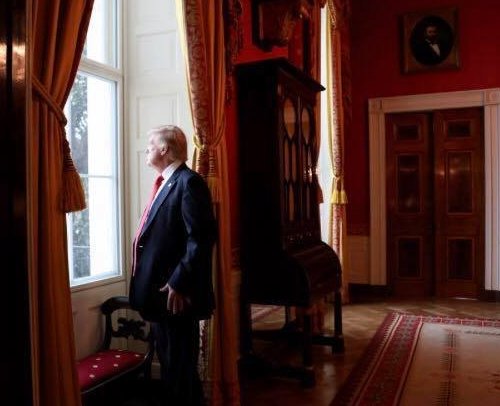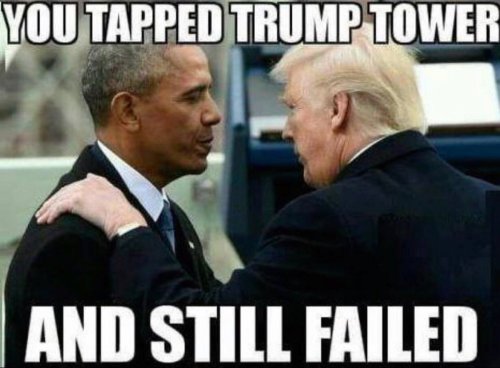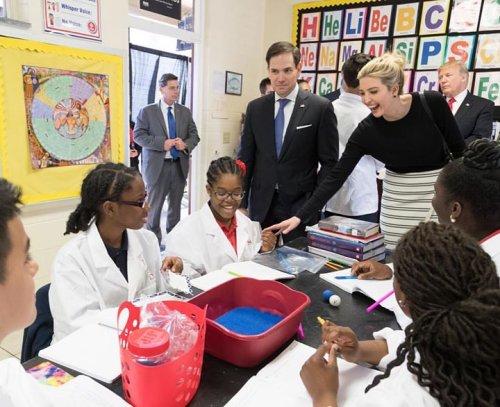ExxonMobil spending $20 billion to expand on the Gulf Coast
President Trump Congratulates Exxon Mobil for Job-Creating Investment Program – Bring Back Jobs !
ExxonMobil spending $20 billion to expand on the Gulf Coast
President Trump Congratulates Exxon Mobil for Job-Creating Investment Program – Bring Back Jobs !
President Trump Surprises First White House Tour Visitors
As White House tours resume, President Trump treated the first group to walk the storied halls on Tuesday with a surprise visit.
The White House announced daily tours would resume on Tuesday after a nearly seven-week pause — an effort led by first lady Melania Trump. The president has a full schedule today including a call with Kenyan President Uhuru Kenyatta and meetings with GOP congressional leadership, but that didn’t stop him from making a quick pit stop to greet students visiting the White House.
The crowd burst into cheers at the sight of the president, and Trump even brought up one young male student whose facial reaction was one of clear happiness.
The Story Behind Donald Trump’s Epic Mar-A-Lago Portrait
At Mar-a-Lago in Palm Beach, a portrait of the club’s owner, Donald Trump, hangs in the bar. Artist Ralph Wolfe Cowan painted “The Visionary,” as it’s called, in 1989.

Can President Trump outlast the White House press corps?
Washington Post
Erik Wemple frets that the journalists tasked with covering Donald Trump’s White House are growing weary thanks to the “unsustainable” pace the president is setting — with long days, “ruined weekends,” and “unpredictable” moves.
President Trump has attempted to undercut the U.S. media in a number of ways — by calling them the “enemy”; by denying coverage credentials to certain outlets during his campaign; by telling falsehoods and lying; by siccing his aides on reporters. As we close in on two months of the Trump White House, however, another strategy may be emerging: Outlast the media.
April D. Ryan, White House correspondent and Washington bureau chief for American Urban Radio Networks, tells this blog that “this pace of covering this new president is unsustainable for the long haul.” That comment came amid a news-filled weekend that wasn’t supposed to be that way. According to a White House official quoted in The Post, Saturday was supposed to be a “down day, pretty quiet.” Someone forgot to tell Trump, who unleashed his now-famous string of tweets alleging involvement by former president Barack Obama in a Trump Tower wiretapping expedition.
All of a sudden, a down day for White House aides as well as for journalists became a tangle of tweets and phone calls and URLs. And this was a Saturday — a day when journalists could once unplug with minimal risk of missing a big story. “Nothing happens on Saturday,” wrote former Bloomberg staffer Dawn Kopecki in a widely read memo to colleagues. “We have very little readership and we’re often paying editors to kill time by surfing the Web.” That was 2015.
The Sunday news cycle kicked off with more morning tweets from Trump as well as a statement from White House press secretary Sean Spicer requesting congressional scrutiny of the allegations in Trump’s wiretapping tweets. Then came another wave of news as the New York Times reported that FBI Director James B. Comey had asked the Justice Department to rebut the wiretapping claims. The weekend? What weekend?
Tweeting, of course, is just one of the ways in which Trump has ruined weekends. Haste is another; after signing a poorly vetted executive order on immigration on Jan. 27 — a Friday — Trump sent the country’s airports into chaos over the ensuing days. Reporters scrambled to cover the protests and the response from the White House, not to mention the actual parameters of the executive order.
Evenings are another thing. “We’re basically together from 6:30 in the morning until about 11 o’clock at night,” said White House Chief of Staff Reince Priebus about the work schedule that he and strategist Stephen K. Bannon maintain. Combine that workaholic dedication with a commitment to the “deconstruction of the administrative state,” as advocated by Bannon, and you have … a lot of stories.
The frenetic nature of the Trump White House was apparent to those who’d watched the frenetic nature of the Trump campaign. “We’re used to Donald Trump as a a candidate making wild accusations at the spur of the moment and that becoming the dominant news story immediately,” says Washington Post White House Bureau Chief Philip Rucker. “So we’re all trained.” And staffed up. Outlets such as Politico — with seven White House reporters — and The Post and the New York Times — six apiece — upped their White House staffing to historic levels. The early weeks raise questions as to whether those deployments will be sufficient. “I think we’re okay,” says Elisabeth Bumiller, the Washington bureau chief for the New York Times. Bumiller was one of two White House reporters in the early days of the George W. Bush administration. That number reached four during the Obama administration — “that’s really because of the demands of the Web,” she says.
Now there’s the Web and there’s Trump, working together. “It’s the demands of the beat,” says Bumiller. “It is completely unpredictable, as you’ve seen, and it’s relentless and we’re also in uncharted territory. We’ve never covered this kind of a president before.” To properly shadow this kind of a president, the New York Times puts two people per day on White House coverage, the better to ensure that there’s someone on the beat from 6 a.m. till midnight. Those folks have what’s called a “duty week” — seven days of breaking-news coverage of Team Trump — after which they rotate into less of a spot-news role and focus on enterprise reporting on the White House.
How long can this go on? “It’ll be that way until he finds some reason to change, but this is who he is,” says Haberman. Though Haberman confesses she’s tired, she says she has trouble unplugging in any case. “I don’t ever totally turn off — Trump or no Trump. I just so happen to have encountered a president who doesn’t turn off,” she says. On Saturday, Haberman recounts that “from the minute I opened my eyes this weekend, my phone was ringing from my desk wanting to talk about Trump’s [tweets], and I had been working till late on Friday. And instead of taking my kids where I was going to take them, my husband did.” Many hours later, Haberman — who credits her history with the New York Post as instilling a never-stop ethic — had to interrupt her workday to bring “someone a cake for a party.” Needy people!
That’s all by way of commentary, not complaint. Rucker echoes the sentiment: “It’s important to note that nobody’s complaining. We’re tired, it’s a lot of work. It takes an extraordinary amount of attention and it can be stressful. But this is our job and it’s what we live to do.”
Politico’s Van Hall says that there’s enough redundancy in the site’s White House team to ensure people come up for air. But: “A lot of reporters do want to be in the game at all times to cover this presidency,” she says.

Wild Thing’s comment.………….
LOL love this, well better taker your vitamins when covering Trump, he is fantastic and in good health. Thank God.

Executive Order Protecting the Nation from Foreign Terrorist Entry into the United States
PROTECTING THE NATION FROM FOREIGN TERRORIST ENTRY INTO THE UNITED STATES
By the authority vested in me as President by the Constitution and the laws of the United States of America, including the Immigration and Nationality Act (INA), 8 U.S.C. 1101 et seq., and section 301 of title 3, United States Code, and to protect the Nation from terrorist activities by foreign nationals admitted to the United States, it is hereby ordered as follows:
Section 1. Policy and Purpose. (a) It is the policy of the United States to protect its citizens from terrorist attacks, including those committed by foreign nationals. The screening and vetting protocols and procedures associated with the visa-issuance process and the United States Refugee Admissions Program (USRAP) play a crucial role in detecting foreign nationals who may commit, aid, or support acts of terrorism and in preventing those individuals from entering the United States. It is therefore the policy of the United States to improve the screening and vetting protocols and procedures associated with the visa-issuance process and the USRAP.
(b) On January 27, 2017, to implement this policy, I issued Executive Order 13769 (Protecting the Nation from Foreign Terrorist Entry into the United States).
(i) Among other actions, Executive Order 13769 suspended for 90 days the entry of certain aliens from seven countries: Iran, Iraq, Libya, Somalia, Sudan, Syria, and Yemen. These are countries that had already been identified as presenting heightened concerns about terrorism and travel to the United States. Specifically, the suspension applied to countries referred to in, or designated under, section 217(a)(12) of the INA, 8 U.S.C. 1187(a)(12), in which Congress restricted use of the Visa Waiver Program for nationals of, and aliens recently present in, (A) Iraq or Syria, (B) any country designated by the Secretary of State as a state sponsor of terrorism (currently Iran, Syria, and Sudan), and (C) any other country designated as a country of concern by the Secretary of Homeland Security, in consultation with the Secretary of State and the Director of National Intelligence. In 2016, the Secretary of Homeland Security designated Libya, Somalia, and Yemen as additional countries of concern for travel purposes, based on consideration of three statutory factors related to terrorism and national security: “(I) whether the presence of an alien in the country or area increases the likelihood that the alien is a credible threat to the national security of the United States; (II) whether a foreign terrorist organization has a significant presence in the country or area; and (III) whether the country or area is a safe haven for terrorists.” 8 U.S.C. 1187(a)(12)(D)(ii). Additionally, Members of Congress have expressed concerns about screening and vetting procedures following recent terrorist attacks in this country and in Europe
(ii) In ordering the temporary suspension of entry described in subsection (b)(i) of this section, I exercised my authority under Article II of the Constitution and under section 212(f) of the INA, which provides in relevant part: “Whenever the President finds that the entry of any aliens or of any class of aliens into the United States would be detrimental to the interests of the United States, he may by proclamation, and for such period as he shall deem necessary, suspend the entry of all aliens or any class of aliens as immigrants or nonimmigrants, or impose on the entry of aliens any restrictions he may deem to be appropriate.” 8 U.S.C. 1182(f). Under these authorities, I determined that, for a brief period of 90 days, while existing screening and vetting procedures were under review, the entry into the United States of certain aliens from the seven identified countries — each afflicted by terrorism in a manner that compromised the ability of the United States to rely on normal decision-making procedures about travel to the United States — would be detrimental to the interests of the United States. Nonetheless, I permitted the Secretary of State and the Secretary of Homeland Security to grant case-by-case waivers when they determined that it was in the national interest to do so.
(iii) Executive Order 13769 also suspended the USRAP for 120 days. Terrorist groups have sought to infiltrate several nations through refugee programs. Accordingly, I temporarily suspended the USRAP pending a review of our procedures for screening and vetting refugees. Nonetheless, I permitted the Secretary of State and the Secretary of Homeland Security to jointly grant case-by-case waivers when they determined that it was in the national interest to do so.
(iv) Executive Order 13769 did not provide a basis for discriminating for or against members of any particular religion. While that order allowed for prioritization of refugee claims from members of persecuted religious minority groups, that priority applied to refugees from every nation, including those in which Islam is a minority religion, and it applied to minority sects within a religion. That order was not motivated by animus toward any religion, but was instead intended to protect the ability of religious minorities — whoever they are and wherever they reside — to avail themselves of the USRAP in light of their particular challenges and circumstances.
Please CLICK HERE TO CONTINUE READING….. Thank you so much.

‘The Obama Camp’s Disingenuous Denials on FISA Surveillance of Trump’
by Andrew C. McCarthy
March 5, 2017
President Trump’s early Saturday morning tweeting has exploded to the forefront an uncovered scandal I’ve been talking about since early January (including in this weekend’s column): The fact that the Obama Justice Department and the FBI investigated associates of Donald Trump, and likely Trump himself, in the heat of the presidential campaign.
.
To summarize, reporting indicates that, prior to June 2016, the Obama Justice Department and FBI considered a criminal investigation of Trump associates, and perhaps Trump himself, based on concerns about connections to Russian financial institutions. Preliminary poking around indicated that there was nothing criminal involved. Rather than shut the case down, though, the Obama Justice Department converted it into a national-security investigation under the Foreign Intelligence Surveillance Act (FISA). FISA allows the government, if it gets court permission, to conduct electronic surveillance (which could include wiretapping, monitoring of e-mail, and the like) against those it alleges are “agents of a foreign power.” FISA applications and the evidence garnered from them are classified – i.e., we would not know about any of this unless someone had leaked classified information to the media, a felony.
In June, the Obama Justice Department submitted an application that apparently “named” Trump in addition to some of his associates. As I have stressed, it is unclear whether “named” in this context indicates that Trump himself was cited as a person the Justice Department was alleging was a Russian agent whom it wanted to surveil. It could instead mean that Trump’s name was merely mentioned in an application that sought to conduct surveillance on other alleged Russian agents. President Trump’s tweets on Saturday claimed that “President Obama . . . tapp[ed] my phones[,]” which makes it more likely that Trump was targeted for surveillance, rather than merely mentioned in the application.
In any event, the FISA court reportedly turned down the Obama Justice Department’s request, which is notable: The FISA court is notoriously solicitous of government requests to conduct national-security surveillance (although, as I’ve noted over the years, the claim by many that it is a rubber-stamp is overblown).
Not taking no for an answer, the Obama Justice Department evidently returned to the FISA court in October 2016, the critical final weeks of the presidential campaign. This time, the Justice Department submitted a narrowly tailored application that did not mention Trump. The court apparently granted it, authorizing surveillance of some Trump associates. It is unknown whether that surveillance is still underway, but the New York Times has identified – again, based on illegal leaks of classified information – at least three of its targets: Paul Manafort (the former Trump campaign chairman who was ousted in August), and two others whose connection to the Trump campaign was loose at best, Manafort’s former political-consulting business partner Roger Stone, and investor Carter Page. The Times report (from mid-January) includes a lot of heavy breathing about potential ties between the Trump campaign and Russia; but it ultimately concedes that the government’s FISA investigation may have nothing to do with Trump, the campaign, or alleged Russian efforts to interfere in the U.S. election by hacking e-mail accounts.
Trump’s tweets on Saturday prompted some interesting “denials” from the Obama camp. These can be summarized in the statement put out by Obama spokesman Kevin Lewis:
A cardinal rule of the Obama Administration was that no White House official ever interfered with any independent investigation led by the Department of Justice. As part of that practice, neither President Obama nor any White House official ever ordered surveillance on any U.S. citizen. Any suggestion otherwise is simply false.
This seems disingenuous on several levels.
First, as Obama officials well know, under the FISA process, it is technically the FISA court that “orders” surveillance. And by statute, it is the Justice Department, not the White House, that represents the government in proceedings before the FISA court. So, the issue is not whether Obama or some member of his White House staff “ordered” surveillance of Trump and his associates. The issues are (a) whether the Obama Justice Department sought such surveillance authorization from the FISA court, and (b) whether, if the Justice Department did that, the White House was aware of or complicit in the decision to do so. Personally, given the explosive and controversial nature of the surveillance request we are talking about – an application to wiretap the presidential candidate of the opposition party, and some of his associates, during the heat of the presidential campaign, based on the allegation that the candidate and his associates were acting as Russian agents – it seems to me that there is less than zero chance that could have happened without consultation between the Justice Department and the White House.
Second, the business about never ordering surveillance against American citizens is nonsense. Obama had American citizens killed in drone operations. Obviously, that was not done in the U.S. or through the FISA process; it was done overseas, under the president’s commander-in-chief and statutory authority during wartime. But the notion that Obama would never have an American subject to surveillance is absurd.
Third, that brings us to a related point: FISA national-security investigations are not like criminal investigations. They are more like covert intelligence operations – which presidents personally sign off on. The intention is not to build a criminal case; it is to gather information about what foreign powers are up, particularly on U.S. soil. One of the points in FISA proceedings’ being classified is that they remain secret – the idea is not to prejudice an American citizen with publication of the fact that he has been subjected to surveillance even though he is not alleged to have engaged in criminal wrongdoing.
Consequently, there is nothing wrong, in principle, with a president’s ordering national-security surveillance of a potential foreign agent who may be helping a foreign power threaten American security and interests. That is one of the president’s main jobs – there would be something wrong if a president, who truly believed the nation was threatened by a foreign power, failed to take action. Prior to FISA’s enactment in 1978, courts had no formal role in the surveillance of foreign agents for national-security purposes – it was a unilateral executive-branch function. Beginning with the Carter administration during FISA’s enactment, it has been the position of presidential administrations of both parties that, despite the enactment of the FISA process, the president maintains inherent authority under Article II of the Constitution to order surveillance even in the absence of court authorization.
Of course, doing so is controversial, as President Bush learned after he directed the NSA to conduct warrantless wiretapping of suspected terrorists following the 9/11 attacks. Nevertheless, we should not allow the statements of Obama spokesmen to confuse us here. The Justice Department and FBI have two missions: (a) criminal law-enforcement and (b) national security. It would be scandalous (though probably not constitutional unconstitutional) for a president to interfere in the law-enforcement mission by ordering the Justice Department to prosecute someone outside its normal procedures. But it would not be inappropriate e–ven though civil libertarians would raise holy hell — for the president to direct warrantless surveillance against a target, even an American citizen, if the president truly believed that target was functioning as an agent of a foreign power threatening U.S. interests.
To be clear, there does not seem to be any evidence, at least that I know of, to suggest that any surveillance or requests to conduct surveillance against then-candidate Donald Trump was done outside the FISA process.
Nevertheless, whether done inside or outside the FISA process, it would be a scandal of Watergate dimension if a presidential administration sought to conduct, or did conduct, national-security surveillance against the presidential candidate of the opposition party. Unless there was some powerful evidence that the candidate was actually acting as an agent of a foreign power, such activity would amount to a pretextual use of national-security power for political purposes. That is the kind of abuse that led to Richard Nixon’s resignation in lieu of impeachment.
Moreover, it cannot be glossed over that, at the very time it appears the Obama Justice Department was seeking to surveil Trump and/or his associates on the pretext that they were Russian agents, the Obama Justice Department was also actively undermining and ultimately closing without charges the criminal investigation of Hillary Clinton despite significant evidence of felony misconduct that threatened national security.
This appears to be extraordinary, politically motivated abuse of presidential power.
Obama Admin Source Confirms Wiretapping
Lt. Col. Shaffer ( Retired U.S. Army intelligence officer speaks out) on wiretapping: This is Soviet behavior
Making The Case – POTUS: Obama Tapped Phones Prior To Election – Fox & Friends

Arabella and I were honored to join Pres. Trump, Marco Rubio, Governor Rick Scott and Secretary Betsy DeVos Friday in Orlando to learn about the great work being done at St. Andrew Catholic School. Thank you to the committed teachers and staff for all that they do for their amazing students.
Recent Comments